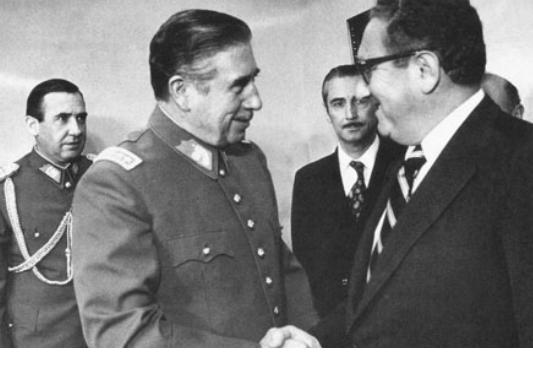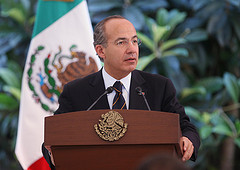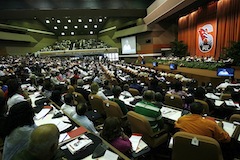
Blog, Cuba, Videos
Raúl Castro’s Speech At Cuba’s Sixth Communist Party Congress
April 17, 2011 By Staff
In a truly extensive democratic exercise, the people freely stated their views, clarified their doubts, proposed amendments, expressed their dissatisfactions and discrepancies, and suggested that we work toward the solution of other problems not included in the document.
Once again the unity and confidence of most Cubans in the Party and the Revolution were put to the test; a unity that far from denying the difference of opinions is strengthened and consolidated by them. Every opinion, without exception, was incorporated to the analysis, which helped to enhance the Draft submitted to the consideration of the delegates to this Congress.
It would be fair to say that, in substance, the Congress was already held in that excellent debate with the people. Now, it is left to us as delegates to engage in the final discussion of the Draft and the election of the higher organs of party leadership.
The Economic Policy Commission of the 6th Party Congress first entrusted with the elaboration of the Draft Guidelines and then with the organization of the discussions has focused on the following five issues:
Reformulation of the guidelines bearing in mind the opinions gathered.
Organization, orientation and control of their implementation.
The thorough training of the cadres and other participants for the implementation of some of the measures already enforced.
Systematic oversight of the agencies and institutions in charge of enforcing the decisions stemming from the guidelines and evaluation of their results.
Leading the process of information to the people.
In compliance with the aforesaid, the Draft Guidelines were reformulated and then submitted to analysis by both the Political Bureau and the Executive Committee of the Council of Ministers, on March 19 and 20, respectively, with the participation of the Secretariat of the Party’s Central Committee and the top leaders of the Central Trade Union (CTC), the Young Communist League (UJC) and the other mass organizations, approved at that level –also as a draft—and then delivered to you for its examination during three days in every provincial delegation to the Congress and for its discussion at the five commissions of this party meeting for its subsequent approval.
Next, I will offer some data to illustrate our people on the results of the discussions of the Draft Guidelines, even though detailed information will be published later.
The original document contained 291 guidelines; 16 of them were moved to others; 94 preserved their phrasing; 181 had their content modified; and, 36 new guidelines were incorporated for a grand total of 311 guidelines in the current draft.
A simple arithmetic operation with these numbers avows the quality of the consultation process as a result of which approximately two thirds of the guidelines –68% to be exact—was reformulated.
The principle that guided this process was that the validity of a proposal would not depend on the number of opinions expressed about it. This is shown by the fact that several guidelines were either modified or removed based on the opinion of only one person or a small number of them.
It is also worth explaining that some opinions were not included at this stage either because the issue deserved a more exhaustive analysis for which the necessary conditions did not exist or because they openly contradicted the essence of socialism, as for example 45 proposals advocating the concentration of property.
I mean that, although the prevailing tendency was a general understanding of and support for the content of the Guidelines, there was no unanimity; and that is precisely what was needed for we really wanted this to be a democratic and serious consultation with the people.
For this reason, I can assure you that the Guidelines are an expression of our people’s will, contained in the policy of the Party, the Government and the State, to update the Economic and Social Model in order to secure the continuity and irreversibility of Socialism as well as the economic development of the country and the improvement of the living standard of our people combined with the indispensible formation of ethical and political values.
As expected, most of the proposals made during the discussion of the Draft Guidelines were focused on Chapter VI, “Social Policy” and Chapter II “Macroeconomic Policies”; both accounted for 50.9% of the total, followed, in descending order, by Chapter XI, “Construction, Housing and Water Resources Policy”; Chapter X, “Transportation Policy”; and, Chapter I, “Economic Management Model.” In fact, 75% of the opinions expressed focused on these five chapters out of a total of twelve.
On the other hand, 67% of the proposals referred to 33 guidelines, that is, 11% of the total. In fact, the highest number of proposals pertained to guidelines number 162, dealing with the removal of the ration book; 61 and 62, on the pricing policy; 262, on passengers’ transportation; 133, on education; 54, related to the establishment of a single currency; and, 143, on the quality of healthcare services.





2 Comments
[…] made the comments during a two-and-a-half-hour speech to inaugurate Cuba’s Sixth Communist Party Congress, the first such meeting the island has seen for 14 years. Castro convened the Congress to discuss […]
[…] Latin America News Dispatch, Apr 22, 2011 – […]
Comments are closed.